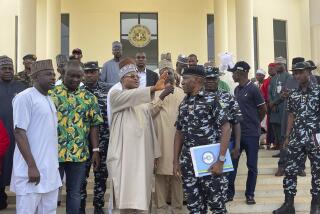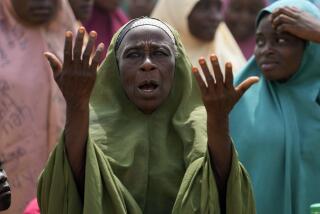Malala meets Nigerian president to talk about missing schoolgirls
- Share via
Reporting from Johannesburg, South Africa — Malala Yousafzai, the teenage campaigner for girls’ education in Pakistan, told journalists on Monday that Nigerian President Goodluck Jonathan assured her he would free 219 abducted schoolgirls being held by Islamist militants.
Malala, who survived a 2012 attack by Pakistani militants opposed to the education of girls, marked July 14 as Malala Day by visiting the Nigerian capital, Abuja, and pressing Jonathan to do more to free the schoolgirls.
But her visit came as a chilling new video surfaced in which Abubakar Shekau, leader of the militant group Boko Haram, said he would not set free his captives unless the government released his fighters from prison.
“Nigerians are saying ‘bring back our girls,’ and we are telling Jonathan to bring back our arrested warriors, our army,” Shekau said in the video, handed to Agence France-Presse news service.
The video was released Sunday, the same day Malala met with parents of the missing schoolgirls abducted by Boko Haram from a boarding school in Chibok village in northeastern Nigeria on April 14. She also met with five girls who managed to escape from captivity.
During her meeting Monday with Jonathan, the Nigerian president agreed to a meeting with the parents of the abducted schoolgirls for the first time, Malala later told reporters. He also promised scholarships to all the girls once they were released.
Malala told journalists after the meeting that the president assured her the girls would be safely recovered. She said that he seemed pained about their fates and referred to them as his “daughters.”
“The president has expressed his solidarity with those girls and his sadness,” she told reporters. “He has assured that these girls will come back home safely. He has several options but that he will choose the best to ensure the girls are released safely.”
In the Boko Haram video, Shekau claimed responsibility for simultaneous bomb attacks last month in Abuja and Lagos, the nation’s commercial hub. He also sent greetings to Al Qaeda leader Ayman Zawahiri; Abu Bakr Baghdadi, head of Islamic State, an Al Qaeda offshoot; and prominent terrorist leaders in Afghanistan, Yemen, Algeria and Pakistan.
Boko Haram, which means “Western education is a sin,” is fighting an insurgency to create an Islamic caliphate in Nigeria, a country of more than 170 million people divided between Christians and Muslims. The group sees democracy, banking, secular education and Western culture as sacrilegious.
Malala, who turned 17 on Saturday, visited Nigeria in support of the #BringBackOurGirls campaign, designed to pressure Nigerian authorities to do more to release the Chibok girls.
“My birthday wish this year is ‘bring back our girls’ now and alive,” she said at Sunday’s meeting in Abuja with Chibok parents and several girls who escaped from Boko Haram.
Malala survived the assassination attempted by the Pakistan Taliban after writing a blog on girls’ education, and she nominated July 14 as a day to stand up for girls’ education. She promised to continue speaking out for the kidnapped girls until they were released, referring to them as her “sisters.”
Nigerian officials have hinted at progress on rescuing the girls in recent weeks, but Jonathan has publicly ruled out negotiating with Boko Haram. The military has said it won’t attempt a rescue operation because many people would be killed. There are reports of behind-the-scenes negotiations to secure the girls’ release.
However, there are hundreds of other women, girls and boys being held by Boko Haram, abducted over the past 18 months in smaller groups.
Shekau posed for the latest video in front of two armored personnel carriers and two pickup trucks surrounded by his men, all armed. At the end of the video, he fired an AK-47 rifle into the air.
Shekau said he had sent a female suicide bomber last month to explode a bomb in Apapa, a district in Lagos where there are many fuel depots. The woman detonated a car bomb next to a oil tanker.
Had the blast ignited the tanker and spread to the nearby fuel depot, it would have been devastating, analysts say, potentially killing many people and disrupting the country’s fuel supply. At the time, authorities misled the public about the incident, according to analysts, when they blamed it on an accidental gas cylinder blast.
“We were the ones that detonated bomb in Abuja, that filthy city. We were responsible for the bomb in Kano, in Plateau,” Shekau said in the video, referring to other recent bomb attacks. “We were the ones that sent a female bomber to the refinery in Lagos.”
Shekau thanked several leaders of terror groups, although it wasn’t clear whether he was thanking them for concrete assistance, inspiration or for something else.
“To you my dear brethren, Muslims, those who are true believers and not those that practice democracy, not those who believe in constitutions, not those who believe in Western education ... I thank you all,” he said.
Follow development in Africa on Twitter at @robyndixon.
More to Read
Sign up for Essential California
The most important California stories and recommendations in your inbox every morning.
You may occasionally receive promotional content from the Los Angeles Times.










